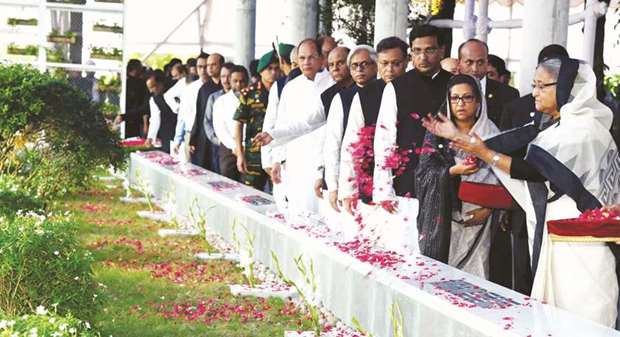Bangladesh is set to constitute a commission to unmask the conspirators behind the assassination of Father of the Nation Bangabandhu Sheikh Mujibur Rahman in 1975.
“We are planning to constitute a commission to unearth those who were behind-the-scene masterminds,” Law Minister Anisul Huq told a discussion at the Directorate of Registration yesterday marking the 42nd martyrdom anniversary of Bangabandhu and National Mourning Day.
The minister said the nation should remember that Bangabandhu was not killed in Lahore rather he was assassinated in Dhaka.
“Mir Jafar (traitors) are amongst us,” he observed.
Huq said the stigma caused by assassinating Bangabandhu in Dhaka will not end with the Bangabandhu murder case.
The minister said if the dream of Bangabandhu to build a Sonar Bangla (Golden Bengal) can be implemented, the nation will be free from the stigma. “I do believe it is not true that only killers of the Bangabandhu were involved in the conspiracy,” he said.
Huq said but it should be remembered that no charge sheet of the murder was submitted for 21 years. The decision of the government to set up a commission was announced two days after Prime Minister Sheikh Hasina publicly said that Khandaker Mostaque and Ziaur Rahman had a hand in the conspiracy to kill Bangabandhu along with most of his family.
“The killers executed the plot in a planned way and there was a big conspiracy. Killer Mostaque and his cohort Ziaur Rahman were involved in that conspiracy as Mostaque declared himself president illegally and Zia army chief soon afterwards,” she said.
“We want to take the country forward, but there are some people who want to push it backward. The country’s people will have to remain alert...”
The premier was addressing a discussion organised by Awami League at the Bangabandhu International Conference Centre marking Bangabandhu’s 42nd death anniversary.
She said, Ziaur Rahman grabbed power illegally and held three posts — president, chief martial law administrator and the army chief — simultaneously.
Hasina said Zia then promulgated the Indemnity Ordinance blocking trials against the killers of Bangabandhu.
He also rehabilitated them by appointing them to various Bangladesh missions abroad.“Zia even freed convicted war criminals.”
She said Barrister Mainul Hosein then formed a progressive political party with killers Huda and Shahriar while Zia made Bangabandhu’s killers prime minister, ministers and even his advisers.
Khaleda Zia made killers Rashid and Huda opposition MPs in the controversial February 15 election in 1996.
Mentioning that nowadays all become vocal when a killing takes place, she said no one questions why those who remained in power after 1975 rewarded the Bangabandhu killers.
She alleged that after the heinous killing, she could not seek justice as that right was snatched through the Indemnity Ordinance. “Ziaur Rahman didn’t allow my younger sister Sheikh Rehana to renew her passport.”
Hasina said Rehana first joined a rally in Sweden in 1979 in protest against the killing of Bangabandhu. Later, an inquiry commission was constituted in 1980 in London comprising Nobel laureate Sharon Bright and British parliament member Sir Tomas William to investigate the killing.
“But Ziaur Rahman didn’t allow them to come to Bangladesh,” she said. She asked why the BNP enforced a general strike on the day when a judge was set to give the verdict in the Bangabandhu murder case.
Earlier Chief Justice Surendra Kumar Sinha terming the killing of Bangabandhu and his family members “cowardly” said many “big shots” were involved in the conspiracy to carry out the killing, but they couldn’t be tried due to weakness in investigation.
“Examining the case records, we found that many big shots were involved in the conspiracy to kill Bangabandhu. But we couldn’t put them on trial because of weakness in the probe of the murder case. We have clearly said in our judgement that it was a criminal conspiracy.
The killing was pre-planned. We called for putting them on trial,” he said.
“Bangabandhu might have had enemies or become an adversary to someone. But his minor son Sheikh Russell, two newlywed sons and younger brother Sheikh Naser, who were not involved in politics, were also killed. What was their fault?
“Their (the killers) intention was to wipe out the name of Bangabandhu family from history.
No other killing in the world bears similarity to this one. We were shocked by the way it was carried out,” the CJ said.
“It was very painful that the trial of Bangabandhu killing had been blocked by a law of the state (indemnity ordinance). As a member of the judiciary, I feel proud the Supreme Court cleared the way for holding the trial by scrapping the indemnity ordinance.
“There was a deep conspiracy in this case. When I was a junior judge of the Supreme Court, I was sick. I was being treated for cancer in Singapore. At that time, there were problems with the constitution of the bench that would hear the case. I was asked to come home soon.
Even though I was not sure whether I would survive, I returned home without completing treatment.
“Today is a shocking day in our history. On this day, the people of Bangladesh lost the architect of independence.”
The CJ mentioned that the founding fathers of two nations in the subcontinent were assassinated — one is Mahatma Gandhi and the other is Bangabandhu Sheikh Mujibur Rahman.

Graves of Mujib’s family members at Banani in Dhaka.
